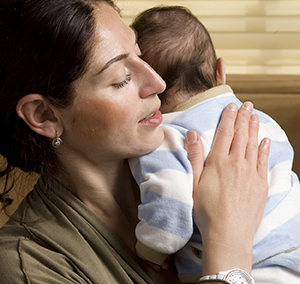Coping with Colic
Does your baby cry nonstop at regular times of the day? If they can't be calmed, your baby may have colic. This condition typically stops at 3 to 4 months. But it may last up to age 6 months. Colic tends to stop on its own. No one is sure exactly what causes colic. Experts do know that it's not a sign of your baby rejecting you or manipulating you. And it's not anything you're doing wrong.

Don’t worry about spoiling your newborn
The feel and scent of a parent brings special comfort to a baby. Touch tells your infant they are not alone. Try these tips when your baby is crying:
-
Use music and motion. Sing and sway.
-
Let your baby hold or suck your finger.
-
Offer a pacifier.
-
Swaddle your baby snugly in a thin blanket.
-
A feeding may stop a newborn’s tears. If it's been 2 hours since the start of the last feeding, you can try offering a feeding.
-
Stay calm. The baby can sense your mood.
When cries don’t stop
-
If you are concerned that your baby's crying is excessive or might be colic, call your baby's healthcare provider. They might want to see your baby and can offer suggestions and support.
-
Carry your baby in a sling or in a front pack. Follow the manufacturer's instructions, and make sure that the nose and mouth are kept clear to prevent suffocation.
-
Give baby a breath of fresh air. Take your infant outside. Walk around a bit. If it’s cold, make sure you’re both bundled up.
-
Most babies like motion and background noise. Take baby for a ride in the car. Or run a vacuum cleaner or a clothes dryer so that baby can hear it.
-
Put baby down for a rest. Leave the room, but listen outside the door. If the cries start to lessen, your little one just needs some time to settle.
-
If baby’s constant crying makes you angry or very upset, get help. Ask your partner, a friend, or a family member to watch the baby. Then take time to calm yourself. You may want to talk with your healthcare provider for support.
-
Take care of yourself so you can care for baby. Eat healthy foods and nap when baby sleeps.
-
Contact the hospital, new parent groups, or a lactation consultant for advice.
-
Stay away from homeopathic or herbal remedies such as gripe water or colic tablets. These are not standardized and may contain harmful substances.
-
Shaking your baby will not stop the crying and it can cause serious brain damage or death. Never shake your baby.
-
Check your baby's diaper. In the first few months, babies soil their diapers frequently.
-
Check your baby's temperature. Sometimes excessive crying may be a sign that your baby is sick. If your baby has a rectal temperature greater than 100.4, call your baby's healthcare provider right away.
-
If you are unable to console your baby, call your baby's healthcare provider for advice.
Online Medical Reviewer:
Donna Freeborn PhD CNM FNP
Online Medical Reviewer:
Heather M Trevino BSN RNC
Online Medical Reviewer:
Liora C Adler MD
Date Last Reviewed:
11/1/2022
© 2000-2025 The StayWell Company, LLC. All rights reserved. This information is not intended as a substitute for professional medical care. Always follow your healthcare professional's instructions.